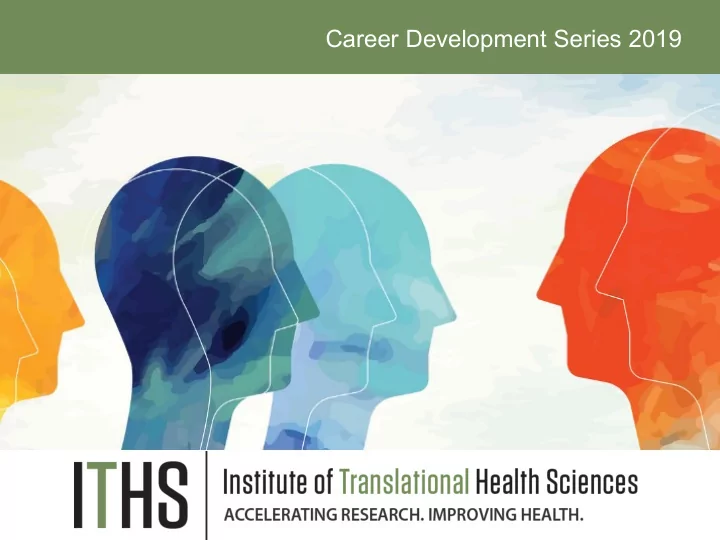

Career Development Series 2019 2
Career Development Series 2019 Grant Writing Nuggets Thank you Presented by Dr. Nora Disis, MD 8
Learning Objectives Discuss the four main components of proposal 1 preparation List three strategies to strengthen writing 2 approaches for a grant proposal Describe the three phases of a proposal pre- 3 submission timeline
Thoughts About & Approaches To Grant Writing 1 Know your grant components 2 Pay attention to details Grant strategy nuggets 3
Grant Writing Nuggets Grant Application Misconceptions ► It’s better to submit something, even if not ready, as it will get revised anyway ► Most grants are awarded after the first submission ► You can only submit one grant to one place at a time ► Reviewers read all their grants on the plane 11
Grant Writing Nuggets Writing is Fun! ► Take time to get up to date in your field ► Develop novel ideas ► Find new collaborators for novel ideas ► Make your game plan for the next few years ► Craft the grant: parts can be used for other projects ► Writing grants is your JOB-don’t take it personally 12
Grant Writing Nuggets Effort Preparing vs. Reviewing COMPONENTS PREPARE REVIEW Specific Aims 1% Grant Foundation Background 75% <5% Preliminary Results 9% 10% Experimental Design 15% 85% GRANT = money and percent effort = EXPERIMENTS
Order of Proposal Preparation
Order of Proposal Preparation
Common Application Format
Preliminary Results What data is innovative? Significant? What data shows you can get the job done? Prove You Can Do The Work Justify Your Idea ► Data needs to be relevant to the ► Show the data in the order of the proposed work Specific Aims ► Make sure the data says what you ► Using difficult or unfamiliar say it says methods? Include “proof of principle” in Prelim. Results ► Data must be legible ► No huge tables ► Show data you may not think is data
Specific Aims Aims accomplished with the money and time requested DONT’S DO’s ► Be specific: ► Be descriptive “To determine what level ras signaling “To characterize the function…” can be inhibited….” ► Multiple aims/sub-aims ► Be repetitive: ► Make one aim the tool needed to Use the theme as the structure of the develop all entire proposal ► Cohesive, but not totally dependent
Experimental Design Above & Beyond Flaws Fatal Flaws ► Potential Pitfalls ► No specifics of ► Experiments will not experiments answer the aims ► Troubleshooting ► No controls ► Descriptive ► Future directions ► Lack of detail ► Can’t do proposed ► Statistician work ► “Fishing expedition” ► Too ambitious ► Already done
Thoughts About & Approaches To Grant Writing 1 Know your grant components 2 Pay attention to details Grant strategy nuggets 3
The Physical Grant: Read a Book Make it easy for the reviewer to read ► Justify both margins ► Limit technical abbreviations, especially non-NIH proposals ► No less than 11 point ► No spelling errors! ► No italics or bolding, just headers ► Conform to instructions ► Short words, sentences, paragraphs ► Know your audience ► Figure legends that describe the ► READ YOUR GRANT OUT LOUD figure Let there be white space!
Write Plainly Density & White Space Research has been cited to demonstrate that an estimated 20% of primary school children are developing reading problems. Passive vs Active Researchers estimate that up to 20% of primary school children have reading problems.
Active Tense Is An Attention Grabber J. Clark, Sen Editor, PLoS Medicine, 2012 Common Common in in news academia reporting
Key To Writing a Successful Grant: Know your limits ! Person ! Idea ? Idea FUND MAYBE Balance innovation with reality ? Person MAYBE DON’T FUND
Know How To Fix Yourself Describe personnel Budget Justification Avoid TBA’s You may be new to research, but the place you are isn’t. Resources and Highlight what is accessible Environment to you. Get help with techniques you Letters of Support have never used. Letters must sound like they know you.
Mentor Letter ► Not only a recommendation ► Mentoring plan – Meetings? Other mentors? Classes? Seminars? ► What is the mentor track record in mentoring? – How many? Where are they now? ► What type of support does the mentor have? – Would you be supported for new ideas? ► After all this….then how wonderful YOU are! ► ADVOCATE FOR YOURSELF- no one cares more about your career than YOU!! Read all letters-revise Don’t forget: Institutional Support-You want them- do they want you?
Thoughts About & Approaches To Grant Writing 1 Know your grant components 2 Pay attention to details Grant strategy nuggets 3
Pre-submission Timeline 28
Plan Your Year of Submissions ► K Awards ► NRSA Data, publications, ► ACS ► DOD fellowship ► Leukemia Society Prostate, breast, ovarian ► Komen Foundation ► AACR/ASCO ► ETC, ETC, ETC 1-2 years, early money Send one grant to multiple places Be aware of the audience that will read your grant Make the proposal specific to the mechanism
Bad News The First Time ► Read reviews and list criticisms ► Respond to each critique remembering the reviewer is always right ► Never ignore a suggestion to remove an aim or add another form of analysis ► If conflicting points are raised, call and ask the review officer ► When you re-submit, do not ignore new findings in the field ► Do not turn the grant in at next cycle if reviews are substantial
Steps To Success ► HAVE SOMEONE ELSE READ THE GRANT before you send it in (give them time) ► Start early ► Work off a preliminary budget- sure fire way to prevent “expansiveness” ► Determine early who you need to help ► Use the reviews to make yourself better Even if the grant is funded
Career Development Series 2019 Thank You Thank you 32
Recommend
More recommend